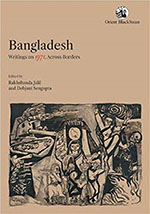This volume puts together literary writings in Urdu and Bangla on the liberation of Bangladesh in 1971. The crop is by no means as plentiful as the writings on Partition, but nevertheless quite appreciable, particularly in Bangla. The great advantage of the volume is that it tries to gather the harvest from both the Eastern and the Western wing of Pakistan, in an effort to provide a holistic perspective. Sadly, the writings in Urdu on 1971, except for a few honourable exceptions, are abstract, inane and escapist. To some extent, it is understandable. When an event challenges the foundational principles of the making of your country as 1971 did to the Pakistani writers and intellectuals, it requires individuals of extraordinary prescience and courage to see the events for what they are and speak the truth without seeking subterfuge in rhetoric, comfortable illusions and half-truths.
The entire crop of writing in Urdu on what the West Pakistani imagination characterized as saqoot-e Dhaka (Fall of Dhaka—imagine the hubris!) contains few specimens that even begin to touch the rawness and blood-soaked immediacy of conflict writing. Let me draw attention to one fact—while Bangla writings of 1971 are replete with copious references to biranganas, an estimated 200000—400000 women who were subjected to genocidal rape as a matter of state policy, writings in Urdu are not only coy about the phenomenon but put it under total erasure.
Continue reading this review

